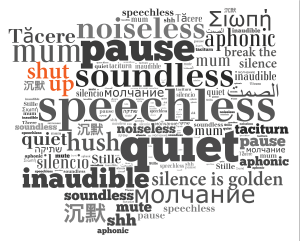Is silence the absence of sound? Is it a refusal to speak – or an inability to respond? What are the politics of silence? How is silence enjoyed, mandated, or inflicted? How are silence and gender related?
This fall, the Scripps College Humanities Institute explores the theory and practice of silence: voluntary and coerced, solitary and communal, literal and metaphoric. Humanities Institute Director Juliet Koss, associate professor of art history at Scripps, hosts a broad range of public lectures, seminars, films, exhibitions and performances in connection with the theme, working in collaboration with such signature campus programs and spaces as the Core Program in Interdisciplinary Humanities, the Scripps College Academy, the Ruth Chandler Williamson Gallery, the Clark Humanities Museum and Denison Library. “Silence will make its presence felt across campus,” says Koss.
Founded in 1986, the Humanities Institute presents lectures, films, exhibitions, conferences and other events each semester on a thematic topic related to the humanities. A distinctive aspect of Scripps’ program is that a select group of students participates each semester as junior fellows, attending events and taking part in a seminar that hosts prominent scholars, activists and artists who contribute to the Institute’s programming.
This fall, the Institute’s exploration of silence includes 15 campus events, which will all be free and open to the public. They begin with the screening of the 2011 documentary “Deaf Jam,” which traces a deaf teen’s entry into the world of spoken-word slam poetry, and end with a campus visit by renowned fiction writer and Proust translator Lydia Davis, who discusses her short stories before leading a seminar on silence and translation. The semester’s roster also includes two exhibitions: Prison Obscura – on view in the Clark Humanities Museum from Sept. 2 through Oct. 17 – presents rarely seen vernacular, surveillance, evidentiary and prisoner-made photographs; a second exhibition, curated by the Humanities Institute Junior Fellows, opens in Denison Library on Oct. 30.
Other visiting speakers include artist and writer Gregg Bordowitz, who interrogates the SILENCE = DEATH campaign in 1980s AIDS activism, and psychoanalyst and sociologist Jeffrey Prager, who explores the intergenerational transmission of trauma with particular attention to post-Holocaust and post-Apartheid contexts. While visiting speakers examine various permutations of silence, Berlin pianist Michael Abramovich will play with musical silences with a performance of John Cage’s 4’33” and other works. In addition to the public programming this semester, field trips will bring the Humanities Institute Junior Fellows to such physical spaces of silence as the Japanese Garden and Zen Court at the Huntington Botanical Gardens in San Marino and the Silent Movie Theater in Los Angeles.
Is silence collaborative, complicit? Does silence signify absence? Does it entail presence? Does silence make you nervous? Hush – let’s think about it.


 This fall, the Scripps College Humanities Institute explores the theory and practice of silence: voluntary and coerced, solitary and communal, literal and metaphoric. Humanities Institute Director Juliet Koss, associate professor of art history at Scripps, hosts a broad range of public lectures, seminars, films, exhibitions and performances in connection with the theme, working in collaboration with such signature campus programs and spaces as the Core Program in Interdisciplinary Humanities, the Scripps College Academy, the Ruth Chandler Williamson Gallery, the Clark Humanities Museum and Denison Library. “Silence will make its presence felt across campus,” says Koss.
This fall, the Scripps College Humanities Institute explores the theory and practice of silence: voluntary and coerced, solitary and communal, literal and metaphoric. Humanities Institute Director Juliet Koss, associate professor of art history at Scripps, hosts a broad range of public lectures, seminars, films, exhibitions and performances in connection with the theme, working in collaboration with such signature campus programs and spaces as the Core Program in Interdisciplinary Humanities, the Scripps College Academy, the Ruth Chandler Williamson Gallery, the Clark Humanities Museum and Denison Library. “Silence will make its presence felt across campus,” says Koss.